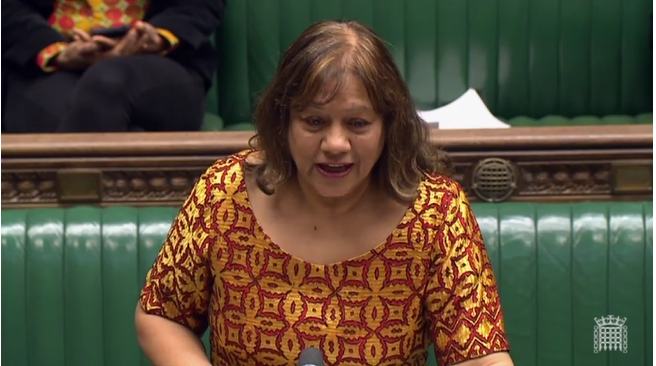- 30/01/2020
- Posted by: Valerie Vaz MP
- Category: News

I responded to the Government’s Business Statement on 30 January, on the eve of Britain’s formal departure from the European Union. You can read my speech below:
I thank the Leader of the House for the forthcoming business. May I start by asking him to clarify the new system that UK Visas and Immigration has put in place? There is a central system, and I was told yesterday that, if I was to write a letter and then ring, I would not get a written response. It is right that if Members write to UKVI, they should get that written response. I would be grateful if he could clarify that.
There is clearly time in the business to update the House on any ongoing negotiations. I am referring, albeit subtly, to negotiations to secure the release of Nazanin Zaghari-Ratcliffe, Anousheh, Kylie and other British hostages. Given that we have a debate on global Britain, I wondered whether anyone would update the House on that. It was raised last week by my hon. Friend the Member for Hampstead and Kilburn (Tulip Siddiq).
The Leader of the House has very kindly given us the dates of sitting Fridays up to January 2021. Can he confirm that this Session will end in May, and that there will be a new Queen’s Speech? Everybody is working to that timetable, so it would be helpful to have that confirmation.
I want to congratulate all the new Select Committee Chairs, but we wait for the machinery of Government to announce some changes, and we hope that that will happen inside this House, not outside it. Clearly, the Department for Exiting the European Union is no more as of 11 pm tomorrow. With parliamentary sovereignty in place, is the Leader of the House able to say which Ministers will be answering questions and appearing before the Exiting the European Union Committee, which still exists? No. 10 has said this:
“The negotiations on the future relationship with the EU will be led from a Taskforce Europe team within Number 10…reporting directly to the Prime Minister.”
How will this taskforce be subject to any parliamentary scrutiny?
There is more taking back control to No. 10, rather than parliamentary scrutiny—which is why we are all here. The Government removed clause 31 from what became the European Union (Withdrawal Agreement) Act 2020. We would have had a vote on trade negotiating objectives, regular reporting during negotiations and a final vote on a final UK-EU trade deal. I thought that people voted in the referendum to take back sovereignty, so can the Leader of the House say why MEPs in Brussels have more say over the UK-EU future relationship than this House? Can we have a debate on parliamentary sovereignty generally and scrutiny of these negotiations specifically?
The Leader of the House will recall these words on Huawei’s involvement in our telecommunications network. It is a “bad policy decision” that risks:
“alienating our closest defence allies, and potentially putting at risk our communication system.”
As someone said, was the Education Secretary stitched up for being right? Can the Leader of the House answer his own question? Will he also find time for a further statement on this decision, as, I think, negotiations are still ongoing? Discussions are still going on with No. 10. This affects our national security, and the Government appear not to have made the case—not even on their own side.
We seem now to have policy by press release. The Prime Minister announced a new talent visa, but no immigration Bill. He says that he wants to attract people of talent. We do, too—this country is brimming with talent that austerity has not allowed to flourish. It is a two-way system. We want the exchange that enables our talented people to work and live abroad. That is why Erasmus was so important. More than 17,000 students at UK universities study or work abroad. Earlier this month, the Government voted down the amendment on Erasmus, and yesterday the Prime Minister said that a statement was due, so can we have that sooner rather than later? It is sad that the Government do not want to be patriotic and invest in our own talent.
Finally, as we leave the EU, let us remember the following: the more than 3 million UK jobs linked to our trade with the EU, which the CBI has estimated to be worth 4% to 5% of GDP, or £62 billion to £72 billion a year; the right to paid holiday leave; maximum working hours; equal treatment for men and women; health and safety standards; and EU investment in climate finance for emerging countries. Let me say something about parliamentary sovereignty, for the record. It was set out by John Laws, in the case of the metric martyrs, which many people will know—he happens to be the uncle of someone who works in No. 10. He said that rights created by the EU must be incorporated into UK law and take precedence, but the legal basis of that supremacy rests with Parliament. Parliament delegated that power to the EU and could take it away at any time—Parliament was always sovereign. Just as the EU evolved, so it will again.
I hope that the Leader of the House will join me in thanking all the public servants who have worked in the EU, our elected representatives, commissioners and civil servants—those who have served their country and put the UK at the heart of Europe. We hope that peace, the security of our citizens and the co-operation of nearly 50 years will live on. Auld acquaintance will never be forgot.

